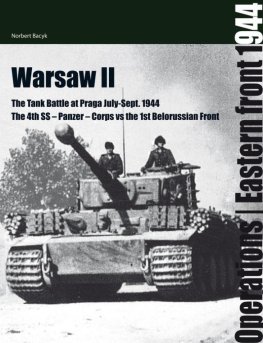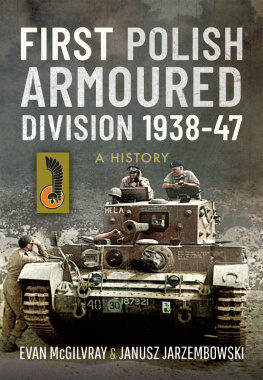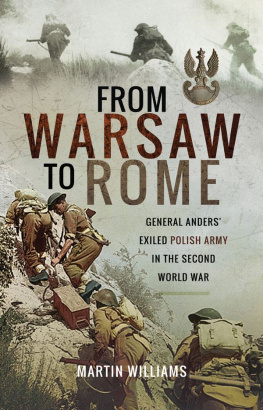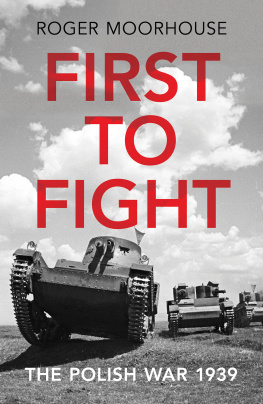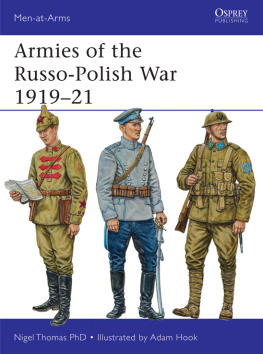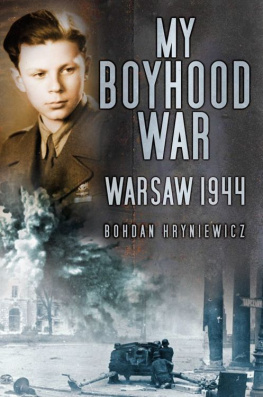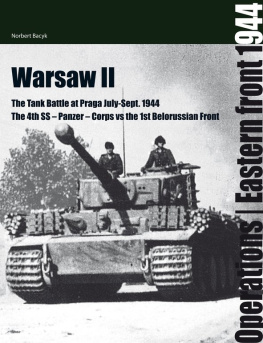First published in Great Britain in 1982 by
William Kimber and Co. Ltd.
Reprinted in this format in 2013 by
PEN & SWORD MILITARY
An imprint of
Pen & Sword Books Ltd
47 Church Street
Barnsley, South Yorkshire
S70 2AS
Copyright The Estate of Stan Sosabowski
ISBN 978 1 78346 261 2
A CIP catalogue record for this book is
available from the British Library
All rights reserved. No part of this book may be reproduced or
transmitted in any form or by any means, electronic or mechanical
including photocopying, recording or by any information storage and
retrieval system, without permission from the Publisher in writing.
Printed and bound in England
By CPI Group (UK) Ltd, Croydon, CR0 4YY
Pen & Sword Books Ltd incorporates the Imprints of Aviation, Atlas,
Family History, Fiction, Maritime, Military, Discovery, Politics, History,
Archaeology, Select, Wharncliffe Local History, Wharncliffe True Crime,
Military Classics, Wharncliffe Transport, Leo Cooper, The Praetorian Press,
Remember When, Seaforth Publishing and Frontline Publishing
For a complete list of Pen & Sword titles please contact
PEN & SWORD BOOKS LIMITED
47 Church Street, Barnsley, South Yorkshire, S70 2AS, England
E-mail: enquiries@pen-and-sword.co.uk
Website: www.pen-and-sword.co.uk
By General Sir Richard Gale,
G.C.B., K.B.E., D.S.O., M.C.
T HIS is a stirring story of a gallant Polish officer.
Major-General Sosabowski was in command of a famous Warsaw Regiment in 1939. He writes of his early childhood in Poland, and, briefly, of his activities up to the Blitzkrieg in 1939.
Vividly he recounts his experiences during the fighting in Poland and of the gallant defence of Warsaw up to the surrender of the city. He then describes how he entered the Polish Underground Army and his experiences there. His account includes a stirring narrative of his hazardous journey to Hungary, of his mission there, and of his burning desire to get back to Warsaw.
He was ordered to go to Paris, and there to report to General Sikorski. Much to his disappointment, instead of returning to Poland he was ordered to command Polish forces in France. He gives a vivid account of things in that country as they appeared to him.
Later he was moved to the United Kingdom, where he raised and trained the Polish Parachute Brigade. In all this he still had one objective, one burning desire: this was to lead his men in the attack for the relief of Warsaw.
Nothing can be more sad than the story of the frustration of this aim. Events, far stronger than he could control, dictated otherwise. This caused an attitude of mind which many of my countrymen found it difficult to understand. Had they read this book, they might have appreciated his point of view more clearly.
He had very definite differences of opinion with those under whose command he was placed, and this led to misunderstanding and lack of confidence. In this book he hides nothing, but just contents himself with giving his own account of events as he saw them.
His description of the fighting at Arnhem as he saw it is written in a soldierly and clear manner.
When one finally closes the book one does so with a feeling of sadness. We went to war for Poland, and we ended up with Poland occupied and divided.
In these days of alliances it is of vital importance that we British should understand our allies. They have points of view, often at variance with ours. Though their aims are the same as ours, their approach to problems will often differ.
The greatness of Marlborough as a leader lay in his ability to see this point and to make an alliance work.
B URIED in the garden of a small villa in the Warsaw suburb of Zoliborz there lies a rusting sabre. Perhaps it is still possible to read on the pitted blade the inscription For honour and glory. It was presented to me in 1912 by my men of the Underground Movement. I buried the sabre reluctantly in October 1939 after receiving orders to quit Warsaw and go to Roumania to bring back a million pounds to finance the Polish Underground Army, then battling against the Germans.
It was the same sabre that I had clutched as I stood to attention before the Commandant of the Polish War Academy in 1936, saying goodbye after six years as one of his professors.
General Ted Kutrzeba looked me firmly in the eye.
Well, it is time for you to leave us, Sosabowski, he said, I appreciate very much the good work you have done. You have turned out some first-class staff officers. But before we say goodbye Id like to give you a bit of friendly advice. You are an independent fellow; you are outspoken and you are critical. These are good points, but I would remind you that few senior officers like to have the opinion of juniors thrust at them, and many will resent it. So watch your step.
He smiled and held out a firm hand.
Thank you, sir, I said. I will look out.
I saluted, turned on my heel and marched from the room.
In 1930, before joining the Academy as a Professor, I had been serving as second-in-command of the 3rd Highland Brigade. My posting came through and the Deputy Divisional Commanderlater General Malinowskisent for me.
Now, Sosabowski, he said, be careful at the War Academy: they wont like it if you are too outspoken. I understand you, but not many senior officers will appreciate adverse comment, no matter how right it may be.
I thanked him and went on my way. Yet, strange to say, in my six years at the Academy I can recall no unhappy incidents of this nature.
Throughout my military life people have warned me to guard my tongue and opinions. As recently as 1957 my old Commander-in-Chief, General Sosnkowski, wrote in a foreword to my book The Shortest Way:
General Sosabowski is a fighting soldier and a commander of determination and knowledge. He is not a man who passively says Yes sir. He has his own viewpoint and is not afraid to express it, sometimes a little bluntly. He believes this kind of behaviour can only help a senior commander. But when a decision is taken and orders given, he is a loyal and conscientious officer.
I suppose it is true that I have a reputation for being difficult, not only with my own people but also with the British in the last war. But I was merely living up to my standards and being myself.
There are many reasons for my character, and in this book I should like to explain how I became what I am; how I learned about soldiering, and about life, the hard way; how I fought the Germans in my beloved homeland; how I escaped with vital information first to France and then to the sanctuary of Britain; why, and how, and where, the Polish Parachute Brigade was formed; and how, finally, I took my brave soldiers into the chaos and havoc of Arnhem.
My story will also tell of the determination and courage of my men. It will tell of the good times and the hard times. It will show, I hope, the light and shade of my career, and tell of some of the generals I metMontgomery; Richard Gale; Boy Browning; Brian Horrocks; Roy Urquhart; and many others, with whom I worked and fought.


